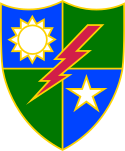
Back 75è Regiment de Rangers Catalan 75. Ranger Regiment Danish 75.º Regimiento Ranger Spanish 75. ranger'i-rügement Estonian هنگ ۷۵ تکاوران Persian 75e régiment de rangers (États-Unis) French 75th Ranger Regiment Italian 第75レンジャー連隊 (アメリカ軍) Japanese 제75레인저연대 Korean 75th Ranger Regiment NB
| 75th Ranger Regiment | |
|---|---|
 75th Ranger Regiment's distinctive unit insignia | |
| Active | 1984–present 1942–present (1st Battalion) 2006–present (Regimental Special Troops Battalion) |
| Country | |
| Branch | |
| Type | Special operations force |
| Role | Special operations |
| Size | 3,623 personnel authorized:[1]
|
| Part of | |
| Headquarters | Fort Moore, Georgia |
| Nickname(s) | Army Rangers Airborne Rangers |
| Motto(s) | Sua Sponte ("Of their own accord") Rangers Lead the Way |
| Color of Beret | Tan |
| Engagements |
Notable operations: |
| Website | www |
| Commanders | |
| Current commander | Colonel Kitefre Oboho |
| Command Sergeant Major | Command Sergeant Major Chris Masters |
| Insignia | |
| Regimental coat of arms |  |
| NATO Map Symbol (1998) |  |
| NATO Map Symbol (2017) |  |
| U.S. Infantry Regiments | ||||
|
The 75th Ranger Regiment, also known as the Army Rangers,[3] is the premier light infantry and direct-action raid force of the United States Army Special Operations Command.[4] The 75th Ranger Regiment is also part of Joint Special Operations Command via the Regimental Reconnaissance Company (RRC).[2][5] The regiment is headquartered at Fort Moore, Georgia and is composed of a regimental headquarters company, a military intelligence battalion, a special troops battalion, and three Ranger battalions.
The 75th Ranger Regiment primarily handles direct action raids in hostile or sensitive environments, often killing or capturing high-value targets. Other missions include airfield seizure, special reconnaissance, personnel recovery, clandestine insertion, and site exploitation.[5][6] The regiment can deploy one Ranger battalion within eighteen hours of alert notification.[5]
The 75th Ranger Regiment is one of the U.S. military's most extensively used units. On December 17, 2020, it marked 7,000 consecutive days of combat operations.[7]
- ^ SPECIAL OPERATIONS FORCES Opportunities Exist to Improve Transparency of Funding and Assess Potential to Lessen Some Deployments. GAO-15-571 (PDF) (Report). Government Accountability Office. July 2015. Archived (PDF) from the original on 22 March 2016. Retrieved 2 June 2016.
- ^ a b "USSOCOM Fact Book – 2017" (PDF). USSOCOM. 2017. pp. 19–20. Archived (PDF) from the original on 27 April 2017. Retrieved 27 March 2017.
- ^ Naylor, Sean (2015). "Chapter 4". Relentless Strike : The Secret History of Joint Special Operations Command (1st ed.). New York: St. Martin's Press. ISBN 978-1-250-01454-2. OCLC 908554550.
- ^ BRANCH, MSG MARCUS; GREER, CPT CHRISTOPHER; KINGSLEY, CPT JONATHAN; KUCHAR, MAJ VINCENT. "The 75th Ranger Regiment Post-OEF: Adapting Training and TTPs Following 13 Years of War" (PDF). Retrieved 16 August 2024.
- ^ a b c Special Operations Forces Reference Manual (Fourth ed.). MacDill AFB, Florida: Joint Special Operations University. June 2015. pp. 78–82. ISBN 9781933749914. Archived from the original on 28 March 2017. Retrieved 27 March 2017.
- ^ "Mission – 75th Ranger Regiment". GoArmy. 23 July 2015. Archived from the original on 12 February 2017. Retrieved 27 March 2017.
- ^ Atlamazoglou, Stavros (23 December 2020). "ARMY RANGERS HAVE BEEN DEPLOYED TO COMBAT FOR 7,000 DAYS STRAIGHT". Sandboxx. Archived from the original on 1 October 2022.